![]()
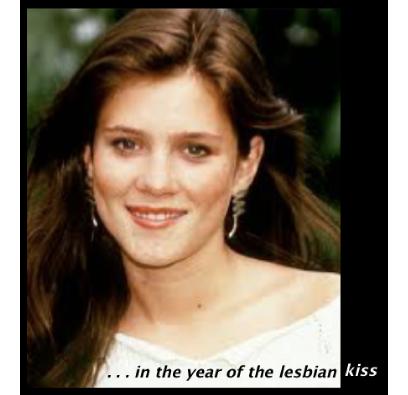
When I first met Anna Friel on the steps of Mersey Television, the home of C4’s Brookside, I was struck by how very petite she was, how young she was, yet how very self-assured. With her lustrous brown hair, perfect complexion, and the slightly flattened vowel sounds with which she spoke, I thought that she was really the perfect Northern princess. I introduced myself and told her that I would be directing her in her upcoming episodes. She shot me a glance and said that she would look forward to it as she went on skipping down the stairs. Little did I know then that this would beThe year of the Lesbian Kiss.
For some time the Brookside producers and writers had been brewing a storyline in which Anna’s character, Beth Jordache, 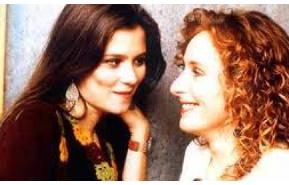 would have a gay romance with the Farnham’s family nanny, Margaret Clemence, played by Nicola Stephenson.If it went through uncensored, it would include the first girl-on-girl kiss to be shown pre-watershed on British TV.
would have a gay romance with the Farnham’s family nanny, Margaret Clemence, played by Nicola Stephenson.If it went through uncensored, it would include the first girl-on-girl kiss to be shown pre-watershed on British TV.
![]()
![]()
Was this believable? Certainly; in fact, it was so believable that a good proportion of viewers thought that Anna really was a lesbian — which was far from the truth. She recounted a story of being in a restaurant shortly after the show had aired when a girl came to the table with a rose, saying that her friend had sent it over as a tribute. When Anna looked round she found that the “friend” was another girl. Unwittingly she had become a gay icon.
Viewing figures rapidly soared and one of my episodes that ran in the aftermath of the kiss gained the highest figures that C4 had, to that date, ever scored. Naturally the producers wanted to spin the story out with new complications, twists and turns, not just for a few more episodes, but for months, perhaps even years, ahead. But Anna was not amused: she felt quite overwhelmed by the unexpected and unwelcome response. Her mailbag swelled out with letters from the gay community congratulating her on coming out; but she also suffered gay bashing to the extent of having men shout abuse at her in the street.
One evening, after a technical rehearsal, I sat with her in one of the empty houses in which the series was shot. While normally she was the cool and controlled professional, it was apparent that she was now rapidly unravelling into a quite distraught and tearful state. She had originally agreed to play out the storyline for what she thought would be just a few episodes; now she felt the company was trying to exploit her. In the falling light we went through her options and their likely outcome, but Anna made all her own decisions. She might be still a teenager and no more than 5’ 2”, but no-one was going to tell her what to do. As I saw her off in a taxi, to meet with the producers, I could have predicted the outcome, but not the laughable way it transpired. Some episodes later another character announced that Beth had died off-screen of a (never before mentioned) congenital heart-disease.
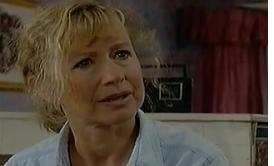 So, the Lesbian theme was left hanging but the producers were not to be thwarted for long. They were soon targeting Jackie Corkhill, played by Sue Jenkins, to take it on. Jackie was the long-suffering, middle-aged and care-worn, wife of Jimmy Corkhill, played by Dean Sullivan, a guilt-ridden ne’er-do-well, serial dug-addicted, small-time cheat, teetering on the brink of mental breakdown. Jackie was no push-over; she was a tough lady, but, what was truly touching was that, though she might see right through Jimmy, she would always stick by her man. Her heart-felt values were deeply rooted in the traditional roles of mother and wife, and this was something which, certainly, I brought to the fore in scenes which I directed. Was it believable that a woman like this would suddenly turn into a lesbian? Decidedly not; in fact, aside from the producers, I never met a single person who thought that it was.
So, the Lesbian theme was left hanging but the producers were not to be thwarted for long. They were soon targeting Jackie Corkhill, played by Sue Jenkins, to take it on. Jackie was the long-suffering, middle-aged and care-worn, wife of Jimmy Corkhill, played by Dean Sullivan, a guilt-ridden ne’er-do-well, serial dug-addicted, small-time cheat, teetering on the brink of mental breakdown. Jackie was no push-over; she was a tough lady, but, what was truly touching was that, though she might see right through Jimmy, she would always stick by her man. Her heart-felt values were deeply rooted in the traditional roles of mother and wife, and this was something which, certainly, I brought to the fore in scenes which I directed. Was it believable that a woman like this would suddenly turn into a lesbian? Decidedly not; in fact, aside from the producers, I never met a single person who thought that it was.
What the producers failed to take into account was that a character is not the same as a person. Occasionally, in real life, people do extraordinarily unexpected things, and one hears about them on the news or reads about them in papers and magazines. On such occasions we say that the person’s character completely changed so that people did not know them any more.Similarly, an actress may have unfettered potential as a person,but as soon as she enters into a story she is playing a character. It is quite conceivable that the producers could have pointed to numerous real-life cases of middle-aged married women suddenly becoming lesbians,but what they did not appear toappreciate was that by imposing this on the role of Jackie Corkhill they were launching a grievous attack on a much-loved character with whom many of their viewers identified.
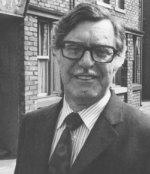 The British TV soap-opera had arisen through the elevation of ordinary workaday characters over the hegemony of plot. Harry Kershaw, one of the early producers on Coronation Street, once explained to me the way he thought of the form of the series as being like the sea — every so often there would be a big wave that would come rolling in and crash on the shore; but as that receded it’s place would be taken by lesser waves, sometimes little more than a ripple, until the next great wave built up to come slowly rolling in from the distance and crash once more over the shingle.
The British TV soap-opera had arisen through the elevation of ordinary workaday characters over the hegemony of plot. Harry Kershaw, one of the early producers on Coronation Street, once explained to me the way he thought of the form of the series as being like the sea — every so often there would be a big wave that would come rolling in and crash on the shore; but as that receded it’s place would be taken by lesser waves, sometimes little more than a ripple, until the next great wave built up to come slowly rolling in from the distance and crash once more over the shingle.
This form gave both actors and writers unprecedented opportunity to explore the minor incidents that make up the texture of everyday life with characters that might otherwise have been passed by. It worked best when there was an implicit partnership between actors and writers that worked to keep a balance between consistency and surprise. As the writers wrote they could imagine just how their lines would be delivered by the actors; at the same time the actors were kept on their toes by new predicaments into which the writers would gleefully pitch their characters
In the early days Brookside, furthered this form by widening the political and social themes of the on-going drama into which their working-class families were embroiled. However, by The Year of The Lesbian Kiss this noble aim had been subverted into a brutal fight for ratings, and sensational plots rode rough-shod over the truth of character. The height of this followed shortly after when the Corkhill’s daughter Lynsey,who had previously been an ordinary single mum working in a chip shop,was turned into a suited and booted bisexual gangster ordering killings and doing deals with the aid of a gun kept in her top drawer. But by this time I hadput the series well behind me.
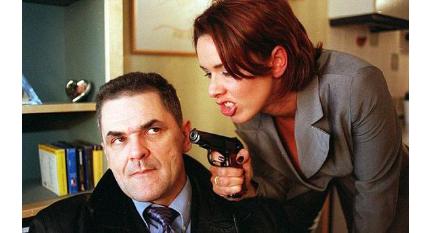
![]()